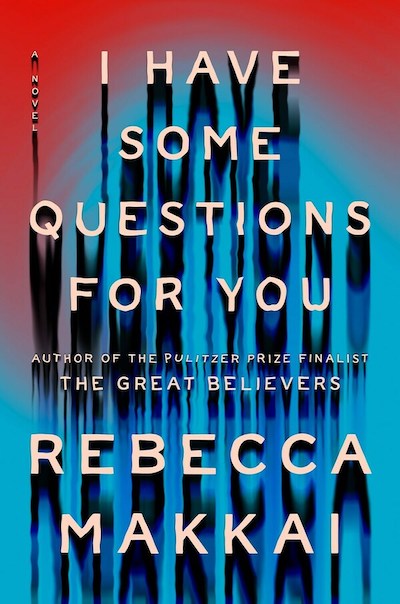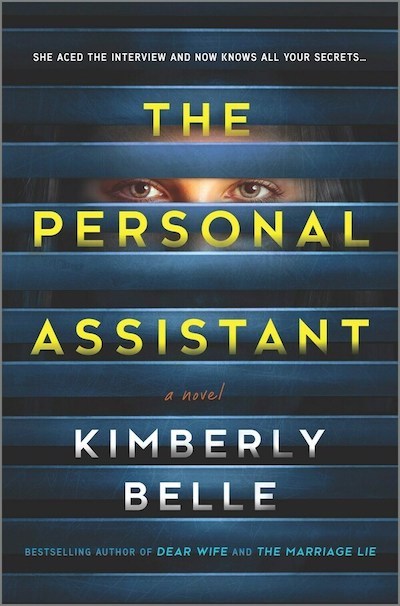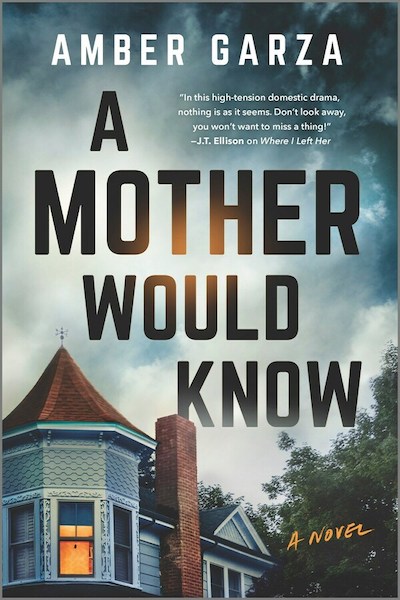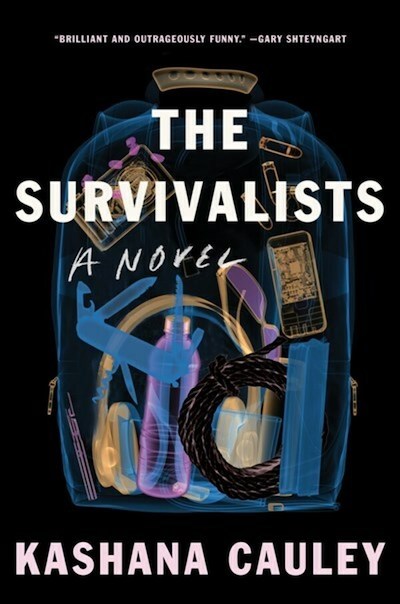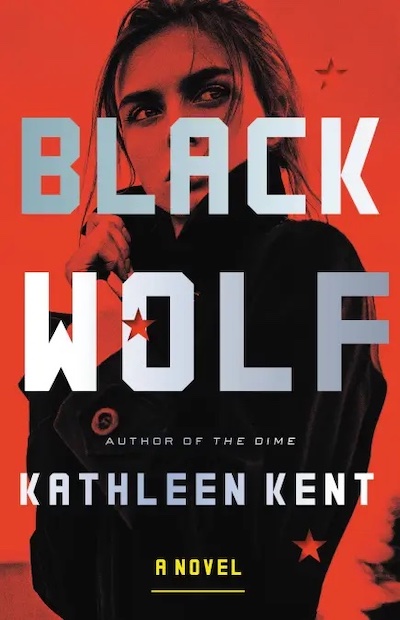This book is centered on one question: back in 1995, did Omar Evans, then a twenty-five-year-old Black man and athletic trainer, murder high school student Thalia Keith? And it’s narrated by one woman, podcaster and Thalia’s roommate, Bodie Kane. From there this novel extends in myriad directions, covers over twenty years, takes us across the country, and dives into Bodie’s past and present, as well as the questionable memories of a whole cast of characters. Yes, it’s a lot, but it’s also brilliantly successful and absolutely riveting. In 2018, Bodie was invited back to teach for two weeks at The Granby School, the elite New England boarding school she attended over 20 years ago. Her students are creating podcasts, with one choosing to revisit Thalia’s murder, a topic Bodie has kept at arm’s length. But gradually Bodie wonders if the police arrested the wrong man and the murderer is walking free. Ultimately convinced of Omar’s innocence, she reaches out to classmates for memories, photographs, any records that could help piece together that evening over twenty years ago. In many ways, what Bodie does is reopen a cold case, without any help from the cops, one that’s rich in newly found details, tacitly informed by #MeToo and Black Lives Matter. While addressing much of the book to a suspect we never meet, over the next several years, Bodie and her students raise enough questions to be taken seriously. Overlaying all this is Bodie’s personal life, including trauma from her past and a break-up with her husband, an artist accused of sexual harassment. Add to this the murders of other women that Makkai tucks around the main narrative, giving Thalia’s murder ever greater context. This is one of the books I’m most eager to share with a book group. It demands discussion.
Women
@UnapologeticallyAlex is Alex Hutchinson’s wildly successful Instagram account, one that is moving toward a million followers until she and her personal assistant AC hit the booze and the next morning her following has turned rabid. Through her hangover haze, Alex sees that she has fifteen thousand notifications that give her in ALL ANGRY CAPS the information she dreads: last night, she trashed another online celebrity in a three-paragraph-long diatribe that might or might not have used the words “attention-seeking slut.” And that’s only the beginning. Alex and her handsome, financial-guru husband, Patrick, who has a successful TV show, along with their twin daughters, find themselves suddenly locked in a spiral of misfortune. Alex’s personal assistant—the one person who could fix this Insta nightmare—is missing. The police discover evidence of a crime in their carriage house. And the normally well-behaved twins are in trouble at school for drinking. Can it get worse? Oh yes, it can. Join Alex for this wild ride—you won’t be sorry!—and get ready for a look at the real world of online fame, which is made to seem both frighteningly exposing and frighteningly isolating by the masterful narrative and especially the inner dialogs of Alex, AC, and Patrick. While this is a thriller with tech as a catalyst, anyone who likes a great story will eat it up (the heaping spoonful of schadenfreude doesn’t hurt).
Remember We Need to Talk about Kevin, Lionel Shriver’s dark novel about a mother’s fraught efforts to understand her violent son? Here, neighbors believe Valerie Jacobs has set up her own version of Shriver’s book: her son, Hudson, suspected years ago of a violent crime, is back home and seems eager to live off mom. Valerie’s daughter, Kendra, is against the arrangement. Valerie has always spoiled Hudson, Kendra says between snapping at her mother’s attempts to be a new grandma and pushing miracle cures for Valerie’s seemingly encroaching Alzheimer’s disease. Then a shock crashes into the setup: a young woman is found murdered in the neighborhood and Valerie’s neighbors immediately point the finger at her home. Even Valerie herself suspects Hudson, except when she’s suspecting herself and her memory gaps. Garza (When I Was You) excels at making our heads spin as facts emerge, some from the present and others the past, adding to both the murkiness and the drama. This tale is constructed on a scaffold of slights, family grudges, deceit, and quiet love, all of which build to an out-of-the-blue reveal. This isn’t—thankfully!—as dark as We Need to Talk about Kevin, but it’s every bit as gripping.
Ready for something completely different? This brilliantly odd and unexpected tale sees striving corporate lawyer Aretha go on—finally!—a great date, one that doesn’t end with her crawling out the bar’s bathroom window to escape (yes, she has) or wondering mid date if she’s already dead. Aaron does arrive in the bar looking like he “[chops] wood for a living right there in the middle of Brooklyn,” but that’s not so unusual for the area. What is unusual is that he’s part of the “dead parents club.” His mom died of cancer while Aretha’s were gored by deer, but her past dates have made her less choosy. This might be why Aretha tries to chalk it down to individuality when she finds that Aaron and his housemates have built a bunker in their garden to keep safe when the world is destroyed, eat only optimized protein soy bars, and own guns (not just a few). As Aretha drops further into this bizarro world, into crime, and away from Aaron, the sadness underneath the spectacle shows itself: this tale is about the rot that sets in when you sell something that doesn’t belong to you. Plagiarism features, with housemate James a perpetrator and Aretha, in a separate event, a victim, but even worse is Aretha and Aaron selling versions of themselves that can never be. A must-read debut.
I’ll admit it: it took me several tries to get past this novel’s disturbing opening scene, in which two women violently murder a man they just met and with whom they have zero connections. They stick him in the trunk of their car for a few hours, only to discover he’s not actually dead. Then they meticulously prep the body—who knew removing teeth to minimize identification was a thing?—and heave the now assuredly dead man over the side of a mountain. Turns out, this is just the latest murder of the serial killer sisters, identical 25-year-old triplets. Typically, their thing is to make men want them and fall in love with them. Then they kill them. It’s about a six-month process, and the first two sisters have racked up three murders each. But Sissy, our protagonist, has yet to make her first kill. She’s pulled her weight with her expertise in cleanup, removing any evidence that could connect the sisters to a murder site or a corpse. But she’s overdue in the murder department. The women have arrived in Arizona so that Sissy can focus on herself, and in no time she’s met the handsome, gentlemanly, church-going widower Edison. They quickly bond, and Sissy delights in her love affair with Edison as much as she enjoys imagining how she’ll kill him and where she’ll bury him. Until things change. Her desire to kill ebbs away, and her sisters grow increasingly anxious as they fear Sissy is pulling out of their agreement. A new, terrifying take on serial killers that will give fans the sleepless nights they crave.
This is an espionage story with a difference, featuring not a dashing ladies’ man but a young CIA operative, Melvina Donleavy, who knows her bureaucracy and sticks to it, offering an interesting look at modern-day tradecraft. Mel appears to her CIA colleagues to have no special skills, but when she’s in danger, top levels of government get involved. Readers are in on the picture, learning from the get-go that Mel has lifelong recall of every face she sees. It freaked out a middle-school crush when she mentioned having seen him at a sports event that had thousands in attendance, but when she’s sent to Byelorussia in 1990 to see if particular Iranian nuclear scientists can be spotted it’s a handy talent indeed. Mel and her colleagues are undercover, the others posing as accountants who are sent ahead of a U.S. donation to make sure none of it is earmarked for nuclear activity, she as their secretary. The stultifying Soviet observation machine moves into place, with the spies watched everywhere they go and a rigid air of we-know-you’re-spies-and-we-know-that-you-know-we-know coming off their hosts in waves. The group soon hears that a serial killer, the Svisloch Dushitel, or Svisloch Strangler, is at work in Minsk, but as its illegal to even mention the crime of serial killing, Mel has her work cut out to get to the bottom of it. Espionage, a love story, and murder mystery, all by a Department of Defense contractor assigned to the former Soviet Union in the ‘90s? Yes, please.
Ready for a psychological game? Liz Bennett wasn’t, but that’s what her marriage has turned out to be—but is the game a one-sided figment of her imagination, or is her husband, Arno, an adulterer who’s playing her along? The backdrop to the maybe game is deep unhappiness and insecurity on Liz’s part. She and Arno are new parents, and motherhood is more difficult than she imagined. It’s not very enjoyable, with baby Emma looking at her “like she’s an elderly spinster I’m grooming for her banking information,” and no time or energy to write a follow-up to her semi-successful first novel. At least she has Arno, who’s worried about his wife’s happiness and shows love and support for her at every turn—a steadfast situation that she’s terrified to lose after she sees a text to him from an attractive coworker, a message that could signify a romance. Liz is soon spiraling into an abyss of fear and suspicion, one that’s incredible enough to keep readers turning the pages but believable enough to elicit real empathy for this broken soul. Sullivan has a way with characters, using dialog and Liz’s astute, cutting observations to bring Arno, crunchy-granola nanny Kyle, and bitchy-perfect sister-in-law Rose (“I’ve been up since 4 a.m.”) to gossip-worthy life. Fans of women’s fiction will eat this up.
Alyssa, née Alice, Macallen, has changed her name and subjugated everything else about herself to please her unpleasable husband, Bill, who has left with no explanation. All Alyssa knows for sure is that he’s taking his wealth with him and she has no job and no prenup, which he insisted was unnecessary because he was going to love her forev—you know the rest. Anyway, Bill’s gone and Alyssa’s sitting in a hotel bar nursing her sorrows when she meets a woman who may be even worse off. Bree Lorrance is living at the hotel after getting away from an abusive boyfriend. She moves into Alyssa’s guest house, and soon readers and Alyssa are wondering how things have taken such a fast turn. Far from lonely and terrifying, Alyssa’s days are now taken up with helping her friend, who encounters a new tragedy that sets the women, and another player who becomes involved and moves in, on an exciting trajectory. We’re left wondering whom Alyssa can trust in her new life, if anyone. Are some of these strange new people part of Bill’s team or out to get her for some other reason? Or maybe Alyssa is making everything up and we’ve got an unreliable narrator on our hands…it’s impossible to know until Ryan brings all to a satisfying ending that readers will never see coming. The author’s fans will snap this up; it’s also a must for Liane Moriarty’s readers.
This novel should come with a warning label: start this book at your own risk. It’s that suspenseful, that seductive. We meet our hero, Morgan Faraday, running through the NYC subway to escape from Sebastian, her ex-fiancé, and two armed rent-a-cops. How does love go so wrong? We then jump to ten months ago for the backstory that answers this question. Morgan—who identifies as Black, she has North African heritage via Moorish Spain, but is often assumed to be white—escaped from a poor Pennsylvania town for NYC and art school. A textile artist, she’s struggling when she meets billionaire Sebastian Reid, the CEO of one of the world’s largest energy companies. The answer to all of Morgan’s problems? Perhaps, but sleeping with a man you don’t love and barely find attractive is still work, and even with best friend Dashawna’s how-to-marry-a-millionaire advice, Morgan remains conflicted. Marrying white men for financial security, while necessary, was never a good decision for the women in her family. Worse, once she moves in with Sebastian, she discovers that his claim that his company is going green is just a façade, and he’s still responsible for several ecological disasters, with communities of color the most adversely affected. Encouraged by an oh-so-hunky environmental activist, Morgan begins to spy on Sebastian, recording his calls and filming his meetings. It’s incredibly anxiety-producing, and readers will be madly racing to the book’s surprising conclusion. Social commentary, feminism, racism, family history, courtroom drama, plenty of suspense, and a very hot love affair all come together for one powerful read.
Murder at the wedding of one of Sri Lanka’s one percent? I initially imagined this to be a cozy affair, with lots of chatter about couture, gossip about affairs, and the body of one of the bridesmaids—the one no one likes—being discovered in the shrubbery, poisoned. Boy, I couldn’t have been more wrong. Yes, no extravagance is spared or undocumented—Vuitton is the bag of choice—but this crime novel is far darker, far more terrifying than I had ever imagined. It’s super-perfect Kaavi’s wedding—she of the billionaire family, the foundation devoted to girl empowerment, the perfect blow-out—and she’s invited her former best friend, Amaya, to the wedding. Not only were the two besties all throughout childhood, they were college roommates in the U.S., until an epic falling out involving Amaya’s boyfriend—whom Kaavi is now set to marry. Though they haven’t spoken in five years, Amaya flies to Colombo with one goal: stop the wedding, by any means necessary. Jealous much? Oh, if only it was mere jealousy in this nothing-is-what-it-seems narrative. Perfectly paced, rich in Sri Lankan culture, witty in its descriptions, and well aware of gender and class disparities, Jayatissa’s creation is that rare bird: the perfect thriller. By the author of My Sweet Girl, this book will appeal to fans of Julie Clark, Samantha Downing, and Lucy Clarke.

